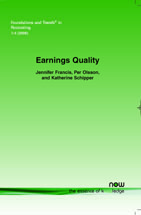Earnings Quality
By Jennifer Francis, Fuqua School of Business, Duke University, USA, jfrancis@duke.edu | Per Olsson, Fuqua School of Business, Duke University, USA, pol@duke.edu | Katherine Schipper, Fuqua School of Business, Duke University, USA, schipper@duke.edu
Abstract
This review lays out a research perspective on earnings quality. We provide an overview of alternative definitions and measures of earnings quality and a discussion of research design choices encountered in earnings quality research. Throughout, we focus on a capital markets setting, as opposed, for example, to a contracting or stewardship setting. Our reason for this choice stems from the view that the capital market uses of accounting information are fundamental, in the sense of providing a basis for other uses, such as stewardship. Because resource allocations are ex ante decisions while contracting/stewardship assessments are ex post evaluations of outcomes, evidence on whether, how and to what degree earnings quality influences capital market resource allocation decisions is fundamental to understanding why and how accounting matters to investors and others, including those charged with stewardship responsibilities. Demonstrating a link between earnings quality and, for example, the costs of equity and debt capital implies a basic economic role in capital allocation decisions for accounting information; this role has only recently been documented in the accounting literature.
We focus on how the precision of financial information in capturing one or more underlying valuation-relevant constructs affects the assessment and use of that information by capital market participants. We emphasize that the choice of constructs to be measured is typically contextual. Our main focus is on the precision of earnings, which we view as a summary indicator of the overall quality of financial reporting. Our intent in discussing research that evaluates the capital market effects of earnings quality is both to stimulate further research in this area and to encourage research on related topics, including, for example, the role of earnings quality in contracting and stewardship.
Earnings Quality
Earnings Quality reviews current research activities around earnings quality. It provides an overview of alternative definitions and measures of earnings quality and a discussion of research design choices encountered in earnings quality research with a focus on capital markets. Earnings Quality examines how the precision of financial information affects the assessment and use of that information by capital market participants. The authors' main focus is on the precision of earnings, which is viewed as a summary indicator of the overall quality of financial reporting.
The authors review: earnings quality and place earnings quality in the context of overall capital market information quality; the determinants of earnings quality, broadly separated into intrinsic determinants that derive from business models and operating environments and reporting determinants that derive from the management's implementation decisions in financial reporting process; twelve measures of earnings quality providing examples of research using these measures, and offer views on which measures are preferable in a given context; research design issues and research findings pertaining to the capital market consequences of earnings quality, in particular its association with expected returns (or the cost of capital) and unexpected (abnormal) returns.
Earnings Quality should be of interest to many participants in the financial reporting process including standard setters, preparers, auditors, regulators, analysts, and financial press commentators. It should be of equal interest to accounting educators and researchers.
